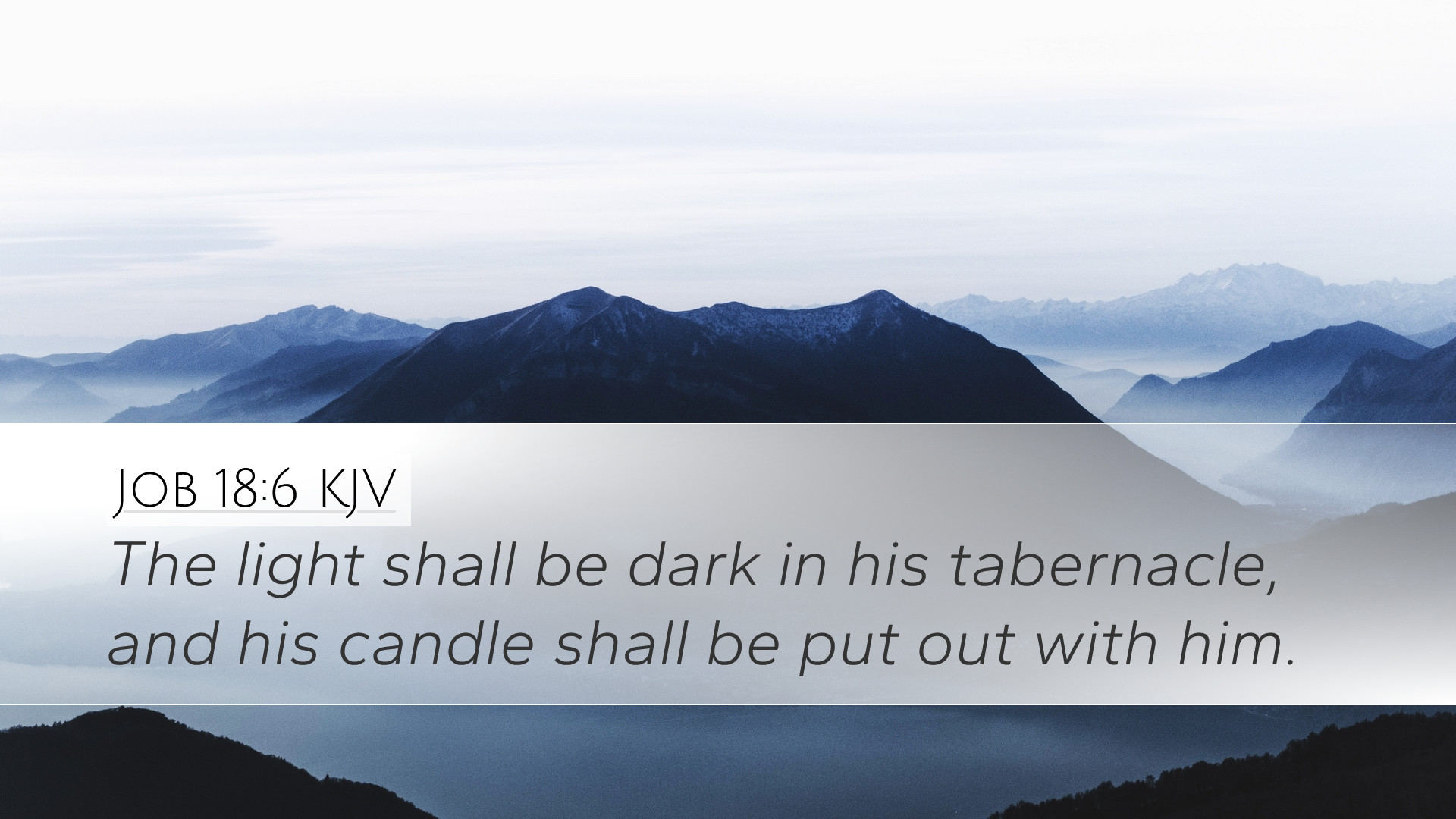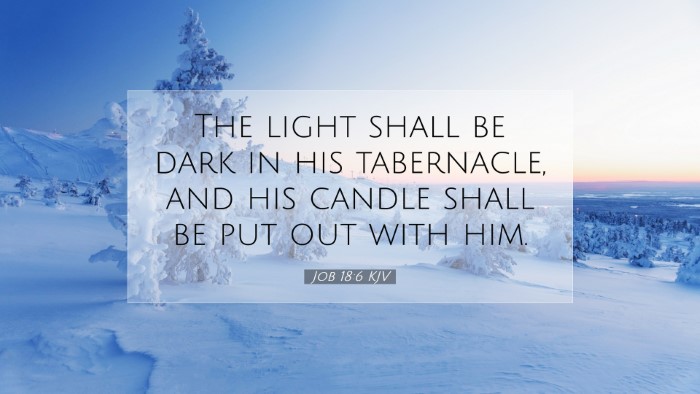Old Testament
Genesis Exodus Leviticus Numbers Deuteronomy Joshua Judges Ruth 1 Samuel 2 Samuel 1 Kings 2 Kings 1 Chronicles 2 Chronicles Ezra Nehemiah Esther Job Psalms Proverbs Ecclesiastes Song of Solomon Isaiah Jeremiah Lamentations Ezekiel Daniel Hosea Joel Amos Obadiah Jonah Micah Nahum Habakkuk Zephaniah Haggai Zechariah MalachiJob 18:6
Job 18:6 KJV
The light shall be dark in his tabernacle, and his candle shall be put out with him.
Job 18:6 Bible Commentary
Commentary on Job 18:6
Verse: "The light shall be dark in his tabernacle, and his candle shall be put out with him."
Introduction
The book of Job is a profound literary work that explores profound questions of suffering, justice, and human endurance in the face of adversity. Job 18:6 serves as a pivotal verse within the discourse of suffering and divine retribution. In this verse, Bildad the Shuhite, one of Job's friends, expresses his belief that the demise of the wicked is marked by darkness and despair. This commentary amalgamates insights from notable public domain scholars such as Matthew Henry, Albert Barnes, and Adam Clarke to provide a rich understanding of this passage.
Context of the Passage
Job 18 is part of a dialogue where Bildad responds to Job's assertions about his integrity and his requests for an audience with God. Bildad, along with his companions, holds a rigid view of retributive justice. They believe that suffering is a direct consequence of sin, and hence, Job's suffering implies his guilt. This perspective informs Bildad's observations about the fate of the wicked, putting Job in a position of defense as he maintains his innocence.
Insights from Matthew Henry
Matthew Henry, in his comprehensive commentary, emphasizes the metaphorical use of light and darkness. He interprets "the light shall be dark in his tabernacle" as highlighting the spiritual and existential gloom that accompanies the life of the wicked. Henry states that the "tabernacle" refers to one's household or family, suggesting that wickedness leads to a curse not only on the individual but also on their immediate surroundings. It illustrates the absence of joy and the omnipresence of despair in the lives of those who live contrary to God's commands.
Insights from Albert Barnes
Albert Barnes offers a slightly different perspective, focusing more on the imagery of the 'candle' or 'light' as a symbol of life, spirit, and divine favor. In his interpretation, to have one's candle extinguished signifies a removal of God's blessing and guidance. Barnes stresses that this metaphor serves as a warning to the wicked, illustrating that when one turns from righteousness, they invite calamity and darkness into their lives. Barnes further argues that the imagery used by Bildad serves to affirm the belief in divine justice, asserting that the ungodly are ultimately left in despair and darkness.
Insights from Adam Clarke
Adam Clarke places a strong emphasis on the emotional and spiritual implications of the passage. He posits that the “darkness in his tabernacle” speaks not only to physical demise but also to the moral and social collapse of those who walk in wickedness. Clarke identifies this verse as part of the broader theological debate regarding justice in suffering. For him, the richness of the text lies in its reminder of the pervasive conditions of life that afflict those who are distanced from divine truth. Darkness becomes not merely a state of being but a deeply rooted condition of the soul, signifying ultimate separation from God.
Theological Implications
The verse raises significant theological questions about the nature of suffering, divine justice, and the fate of the unrighteous. The interpretations provided by these scholars highlight that suffering is not solely a physical or temporal state but is deeply intertwined with one's relationship with God. It calls into question the assumptions about the nature of God as a just judge and how His justice manifests in human experience. This framework compels pastors, students, and theologians alike to contemplate the complexities of divine justice and mercy.
Relevance for Today
Job 18:6 serves as a powerful reminder of the consequences of living apart from God's will. In contemporary discussions on suffering and justice, this verse encourages deep reflection on the condition of the heart. The symbolic meanings of light and darkness urge individuals to evaluate their spiritual state and the overall health of their communities. Furthermore, it invites readers to consider the wider implications of their actions and their alignment with divine principles of light and life.
Conclusion
In summary, Job 18:6 encapsulates profound insights into the fate of the wicked and the overarching theme of justice in the midst of suffering. Through the interpretations of Matthew Henry, Albert Barnes, and Adam Clarke, readers glean a multifaceted understanding that extends beyond the immediate context. They highlight the enduring truth that a life apart from God is marked by darkness and despair, challenging pastors, theologians, and students to strive for righteousness and to lead their communities toward the illuminating truth of God’s Word.


